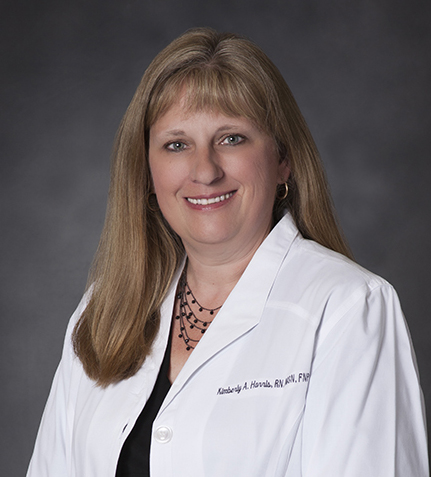Kimberly Harris, RN, MSN, FNP
One-on-One with Hormone Therapy Specialist Kimberly Harris, RN, MSN, FNP
What do you find most rewarding about being a hormone therapy specialist?
Most of the time our new patients are really feeling bad by the time they get to Synergy. They’ve been to their regular doctor and whatever they were told or however they were treated just wasn’t working.
It is very rewarding to be able to show someone their lab results and explain why they’re feeling so bad — then tell them how we are going to fix it. They leave with a feeling of hope. When they come back for the follow-up visit, it’s always enjoyable to hear them talk about their progress and to show them the positive changes in their lab values. It’s very fulfilling to see their smiles and hear their positive feedback.
What main factors change a woman’s hormone levels?
- Age
- Weight/insulin resistance/exercise (all tied together somewhat)
- Other medical problems or medications such as:
- thyroid disease
- pituitary tumors
- steroids
- antibiotics
- birth control
After 23 years as an NP and 20 years in GYN, what did you see that was missing from mainstream medicine that drew you to the more holistic side of the field — mainly hormone therapy?
What’s missing is the ability to spend time with a patient and hear the whole story of what’s going on in their life. In traditional medicine, we get 15 minutes per patient. At Synergy we spend an hour or more in the first visit to really get to know the patient and get a better picture of their life and health as a whole.
We have the time to talk about all aspects of their health, not just one small part of it. So many patients come to our doctors for what appears to be a little problem, but it is actually just a trickle down from a myriad of issues with their whole lifestyle. It is a joy to be able help patients see that and fix the whole picture.
Please walk through what happens within the first hour or two of that initial appointment.
When new patients come in we get to know them as best we can through some valuable one-on-one time. We discuss personal health history, family history, social history, work/career information, leisure/ hobbies, religious background, current complaints/concerns, and menopause symptoms. We also do a sexual dysfunction assessment and a dietary assessment.
Our patients love this process because it leads to better results. Many times they feel their other doctors don’t listen.
Next is a brief physical exam followed by a review of the patient’s labs (which were taken in advance by their family doctor), and a discussion on the importance of diet and exercise. We then provide the patient with our recommended treatment.
The patient comes back in about three months to have their labs rechecked and for a 30-minute follow up visit where we discuss the progress they’ve made and adjust the hormones or supplements as needed.
What are the most common symptoms a woman can watch for to know if she should have her hormone levels checked?
- Amenorrhea
- Hot flashes / night sweats
- Disrupted sleep
- Vaginal dryness / painful intercourse
What are three pieces of advice you give to women who want more energy?
- Drastically reduce sugar and carb intake while increasing protein.
- Exercise every day at least 30 minutes, even just walking. The more you do, the better you will feel.
- Get 6-8 hours of quality sleep.







